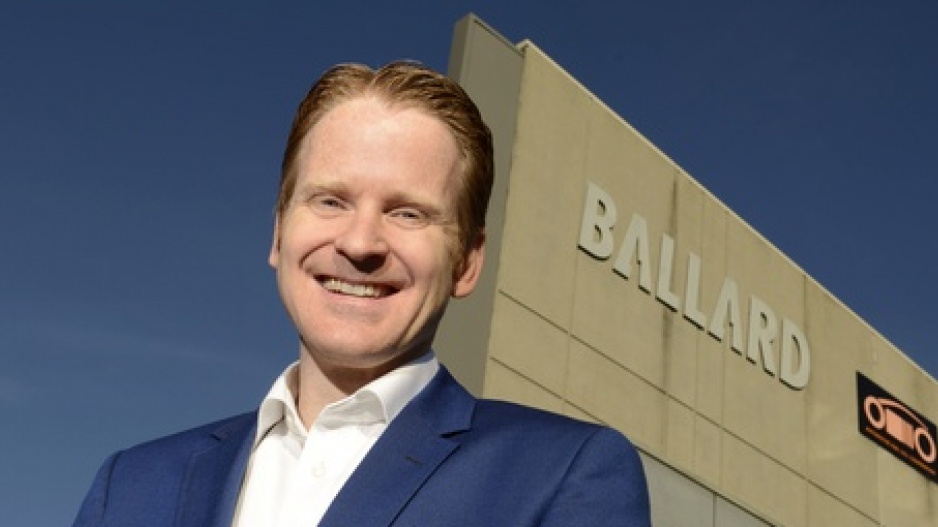Five hundred Chinese trucks equipped with fuel-cell stacks are hitting the road this year in Shanghai.
The cube trucks, using technology developed in Burnaby, have each received so-called “green licence plates” that remove restrictions on movement through Chinese cities (gasoline-powered vehicles are banned from travelling through certain areas on certain days to reduce pollution).
All the trucks are expected to be delivering goods within Shanghai’s city limits within the year.
And the deployment of these fuel-cell-powered trucks is expected to be the largest in the world, according to Ballard Power Systems Inc. (TSX:BLDP) CEO Randy MacEwen, whose company developed the fuel-cell stacks.
The deployment comes at a time when Ballard has come under the microscope regarding whether its reliance on the Chinese market is justified.
A January report from Spruce Point Capital Management sent Ballard’s share prices plummeting 22% after the short-seller concluded the Canadian firm’s 2017 stock price run-up of 167% had more to do with hype over a nascent market than business fundamentals.
“We have conducted on-the-ground due diligence in China and believe that Ballard’s Chinese growth ambitions are likely to fail from weak partnerships with Broad Ocean and [Synergy Ballard JV], and a market that is not developed enough to support fuel-cell vehicle growth,” the report stated.
Tenuous business relationships in China aren’t an unknown for Ballard.
Prior to MacEwen’s tenure, the company signed a US$17 million deal with a business partner in Beijing, Azure Hydrogen, before cutting ties with the Chinese firm.
Ballard claimed it spent nearly two years providing fuel-cell modules for hydrogen buses, later licensing its telecom backup system, before money eventually stopped coming in from Azure despite the services being rendered.
The deal ended up costing Ballard US$7.5 million, which MacEwen described at the time as a “costly and embarrassing toast-up.”
Spruce Point concluded Ballard’s local partners – Yunfu city government (Synergy) and Broad Ocean – have insufficient connections to China’s central ministries that are limiting its potential partnerships with state-owned enterprises.
Furthermore, the short-seller found China’s lack of refuelling infrastructure, confusion over refuelling subsidies and “abysmal” refuelling station economics are hampering Ballard’s commercial prospects.
The report estimated China had 36 licensed fuel-cell vehicles on the road and six refuelling stations – only one of which was open to the public.
Andreas Truckenbrodt, who serves as CEO of the Canadian Hydrogen and Fuel Cell Association and was visiting China last month, said he disagreed with the conclusions of the Spruce Point report.
“China needs clean energy, and they know that,” Truckenbrodt said, adding he’s witnessed the Chinese market shift a significant amount of its focus from electric vehicles to fuel-cell technology.
“The reason why they’re so interested in what we have here is fuel-cell experts don’t grow on trees, and it’s relatively high-level expertise you need. And we have that here.”
It appeared investors also disagreed with the report’s conclusion.
Ballard fired back in the days that followed Spruce Capital’s conclusions, forecasting record annual revenue of $120 million for the 2017 fiscal year.
The company also took issue with specifics in the report, denying claims the Synergy Ballard joint venture produced only a few hundred fuel-cell stacks per year.
“In fact, the joint venture has produced 1,145 stacks since beginning operations in September 2017,” the company said in a statement.
Following Ballard’s response, the company’s shares bounced back to erase the losses that followed the Spruce Capital report.
Electron Communications consultant Matthew Klippenstein, who previously worked as an engineer at Ballard, said the current management regime has been successful at generating partnerships at very little financial cost.
He said it would be wiser to view the fuel-cell potential in China from a short-term perspective, which can be prone to boom-and-bust cycles, as well as a long-term perspective.
And in the long term, Klippenstein said there’s huge upside potential for the industry based on China’s determination to become less dependent on oil.
“It is true that Ballard hasn’t had luck at choosing international partners before. That said, it would be a miracle to only have good luck in any emerging industry,” he said.
“Because the fuel-cell market is still nascent, you’d be hard pressed to find a Chinese partner who was just going bonkers-great with their development activities.”




